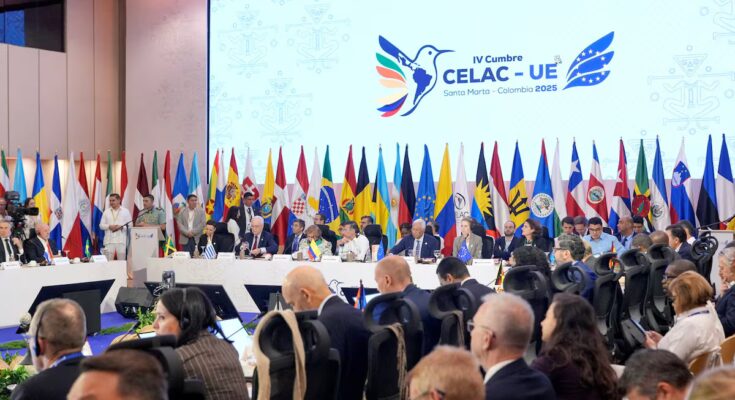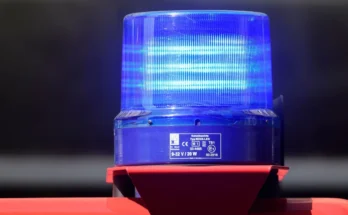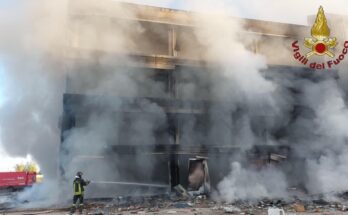On Sunday evening, at the end of the fourth summit of the Community of Latin American and Caribbean States (CELAC) and the European Union (EU), the host president, Colombian Gustavo Petro, listed the Latin American countries that have signed the final declaration of the meeting. The absence of Nicaragua, which had already announced its intention to block the entire process, was expected without too many surprises. What no one expected was that Venezuela was not on the list. Nicolás Maduro’s government had decided to “dissociate”, this is the diplomatic term in use, from the text and at the last minute, after having participated in all the previous negotiations, did not sign. A day after the summit closed, the diplomatic sources consulted were unable to find a rational explanation for Caracas’ strategy.
What happened in Venezuela “is an inexplicable diplomatic suicide”, say a South American Foreign Ministry. Another Foreign Ministry refers to the “madness” of isolating itself at a time when Caracas is threatened by the United States. The attacks ordered by Donald Trump against alleged boats of Venezuelan drug traffickers in the Caribbean waters place the Maduro government in a situation of extreme political tension. From Washington they openly raise the specter of a possible military attack under the cover of the fight against drug trafficking. CELAC, created as an alternative to the Organization of American States (OAS) without the United States, seemed the ideal space for Venezuela to shelter behind a blanket of regional support.
The summit’s 52-point document remained dormant for months. And he received the final points during the week preceding the meeting of heads of state in Santa Marta, Colombia. The negotiators already knew that Nicaragua would not sign, faithful to its strategy of “dropping the bomb” and therefore blocking any agreement. The Venezuelan delegation, led over the weekend by Foreign Minister Yván Gil, “said little and focused on chapter 10”, the one relating to the repudiation by the blocs of US operations in the Caribbean and the Pacific, which have already caused almost 70 deaths. Before the latest meeting, Maduro sent a letter calling on participating countries to take action against what he saw as “armed and lethal acts” produced “under the justification of ‘security’ or ‘fighting crime.’
The text of the chapter states in its final version that the parties address “the importance of maritime security and regional stability in the Caribbean”. He does not mention the United States, a classic strategy in diplomatic texts to garner as much support as possible without causing offense. Venezuela could have “dissociated” from that particular point, a mechanism that debuted at this Santa Marta summit to prevent a single member of the group from blocking the entire resolution. The document contains at the bottom of the page the list of countries and points that have not signed. The most active in the right of complaint were Argentina – for everything related to the 2030 Agenda and gender policies -, Paraguay, Ecuador, El Salvador and Costa Rica.
Venezuela failed in its attempt to toughen the Chapter 10 text, but complied and did not propose to dissociate. Then, throughout Sunday, he asked to reopen the discussion on another point, number 14, in which the blocs express their “concern” about the war in Ukraine and “its immense human suffering”. Venezuela’s negotiating push was key to the approval of the chapter on Ukraine during the CELAC-EU summit in Brussels in 2023. This year’s text has more substance and Caracas was expected to oppose it. Throughout Sunday afternoon, the Venezuelan delegation requested that the document be reopened for discussion, but to no avail. “The surprise was that instead of dissociating himself from Chapter 14, he got rid of everything,” they revealed from an American foreign ministry.
Kaja Kallas, high representative of the European Union’s Foreign Relations, said in an interview with EL PAÍS that, unlike Nicaragua, “Venezuela initially agreed, but ultimately decided to withdraw from the declaration due to its criticism of point 14.” “It’s interesting, because while we hear Venezuela complaining about non-compliance with international law (due to US attacks in Caribbean waters), they refuse to sign a statement on an apparent armed attack three years ago. They should always apply the same standard,” Kallas said.
Asked by this newspaper about Venezuela’s withdrawal, the president of the European Council and co-host of the summit, António Costa, responded: “These summits are a great opportunity to open new spaces for dialogue, even – or rather, especially – when ideological and opinion differences are great. It is not advisable to waste this type of opportunity.”
Venezuela’s departure ended one hour before the presentation of the summit’s final document. He went so far beyond the pale that he appeared as a signatory in a draft circulated in the press when negotiators already considered the matter closed. Then Petro came out and instead of naming the 33 CELAC countries he listed 31. Venezuela was excluded. “Cuba also negotiated a lot, every point and in the end signed everything. Nicaragua blocked and Venezuela decided to dissociate. The reasons are difficult to understand. Up until an hour before the final declaration it was inside,” says a senior diplomatic source. Did Caracas accept the rejection of the Ukraine chapter out of solidarity with Russia? “It’s possible, but who knows,” replies the same source.



